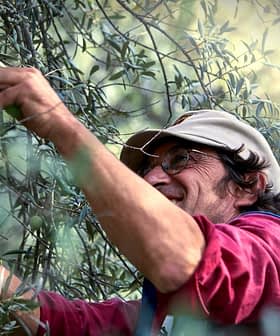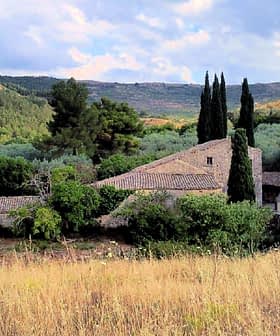Italy Sees Significant Growth in Culinary Tourism
The 2023 Wine and Food Tourism Report showed a 37 percent increase in food-related travel experiences.
 Watching how food is produced increases the price customers are willing to pay. (Photo: Roberta Garibaldi)
Watching how food is produced increases the price customers are willing to pay. (Photo: Roberta Garibaldi) Fifty-eight percent of Italian tourists in 2023 are choosing holiday destinations linked with food experiences, a 37 percent increase from 2016, a new report has found.
The trend benefits olive millers and farmhouses, offering tourists olive oil-related experiences.
This trend generates virtuous economies, which represents the best opportunity for the small farmers to see the value of their products finally recognized through direct sale.
According to the 2023 Wine and Food Tourism Report, 9.6 million Italian tourists who plan at least one of their trips to a food-related destination said these tourism opportunities are among their top priorities.
Approximately seven out of 10 Italian tourists traveling domestically this year consider food experiences part of their vacations, a 25 percent increase compared to 2021.
See Also:A New Project to Promote Olive Oil Roads in PugliaOlive oil plays a significant role in tourists’ interests, with 64 percent planning an olive oil-related experience.
According to the data of more than 320,000 tourists, one in three plans to spend more than in 2022 on food and wine tourism.
The report, supported by numerous institutions in Italy and abroad, is built on the contribution of several food and tourism experts.
“In the last 10 years, food and wine tourism became increasingly relevant,” Roberta Garibaldi, author of the report and president of the Italian Wine and Food Tourism Association, wrote in the introduction. “New methods, places, forms have conquered the market and sprung new experiences.”
Culinary tourism
Culinary tourism refers to the exploration and experience of different food and beverage offerings in a particular region or country. It involves travelers seeking out local cuisines, traditional dishes, culinary traditions, food festivals, local markets, cooking classes, and dining at renowned restaurants to immerse themselves in the gastronomic culture of a destination. Culinary tourism allows travelers to discover the unique flavors, ingredients, and culinary heritage of a place, making it a significant aspect of cultural exploration and travel experiences.
“The involvement of the senses became relevant and a means to enjoy the cultural heritage of the different locations actively, letting tourists immerse in the life and the traditions of the local communities,” she added.
Walks in nature and through olive groves and vineyards, olive oil and wine tastings associated with events combining nature, music and art are some of the most sought-after activities.
“The wine and food touristic growth intertwined with quality local food production might boost the growth of the smaller agri-food districts,” Mauro Rosati, general director of the Qualivita Foundation and contributor to the report, told Olive Oil Times.
“This trend generates virtuous economies, which represents the best opportunity for the small farmers to see the value of their products finally recognized through direct sale,” he added. “And that happens because going to the region, tourists can understand much better why a wine might cost €20 or an olive oil €40.”
Due to a European Union reform, the consortia presiding over protecting local certified agri-food productions, such as the Protected Designation of Origin (PDO), are recognized for their growing role in wine and food tourism.

Nearly two out of three tourists to Italy say they are planning an olive oil-related experience.
“For small producers, adhering to the consortia might be complex and even expensive, but in the new scenario, it might lend a unique opportunity to stay in the market,” Rosati said.
“Consortia certify quality,” he added. “Recognizing a certified status to their production might give small producers a chance to survive in a complex market.”
“Locally, consortia promote specific certified products of the region, engaging tourist fluxes and creating new direct sales opportunities for small producers,” Rosati continued.
According to the report, 63 percent of food tourists said they are specifically looking for destinations that allow for direct experiences at farms and wineries.
A growing number of tourists also seek ‘workation’ opportunities, which allow them to work remotely while traveling and exploring rural areas.
Foraging and survival courses are also becoming popular and are often supplemented by consuming innovative food options in olive mills, wine cellars and beer breweries.
Food culture is essential for most tourists. Seventy-six percent want to know more about their destination’s wine and food culture, and 61 percent ask for anecdotes and the history of the farm or producer they are visiting.
According to the report, farmhouses, restaurants and operators in rural areas might benefit from offering health-related food and wellness experiences, with 71 percent of the tourists interested in healthy food and the Mediterranean diet.
In recent years, the opportunities triggered by the new vacation trends generated many different offerings from local producers. As a result, the report underlines how these tourism tendencies must follow sustainable governance.
“Today, we need to evolve the organization of the tourism fluxes so that tourism sustainability ensues,” Rosati said. “We cannot send loads of tourists to local quality producers just like we would to a shopping mall. Quality and products require time to be understood and perceived; activities must be sustainable.”
According to Rosati, tourism operators looking to take advantage of new opportunities must meet specific criteria. “The land must be respected,” he said. “Activities must be well-thought. Everything starts from the protection of the certified regional productions.”
“To avoid improvisation and damage to the reputation of locally certified products, we need quality in the touristic activities,” Rosati added.
According to Rosati, the adoption of quality products, dedicated tourism courses for producers, and safeguarding of the land should constitute the basis of the new food-related tourism in the country.
“We need to avoid what happened in some Italian cities, reached by masses of tourists who come in such large numbers that at times sustainability and quality cannot be granted,” Rosati said.
“Sustainability must be the foundation of the experience,” he added. “For example, if we want to reach the younger generations, sustainability becomes crucial, as it is part of their interest and way of living.”
“Today, many, even more in larger operations, seem to embrace sustainability only as a means for marketing their activities, though,” he continued. “We need to make a step forward, a leap to make sustainability the basics of the activity.”
Rosati emphasized that social and environmental sustainability are, after all, the basis of the PDOs and other geographical certifications.
According to the report, other areas where improvements should be made to meet the growing demand include an improved bureaucracy for local producers, better ways to inform the tourists, easier tools for booking touristic opportunities, and help smaller farms adopt digital tools.
Opportunities lie ahead for often neglected locations in the country. “Responsible, conscious and sustainable tourism might give life to a region, especially when it is based on wine and food… it is a vehicle of identity, a universal language for connections, a form of hospitality,” Sara Roversi from the Future Food Institute wrote in a dedicated essay in the report.
“For the regeneration process originating from the food and wine heritage to be feasible and replicable, a concrete investment action (not only economic, but also symbolic) is needed in the marginal areas,” she added.









